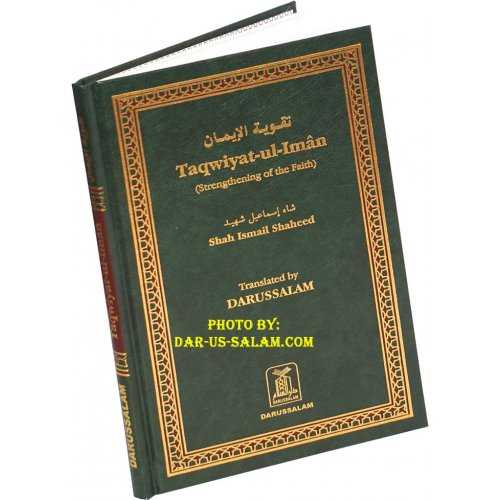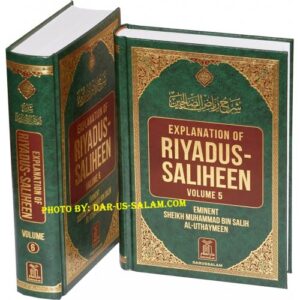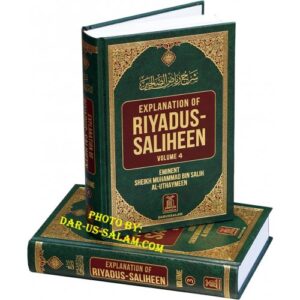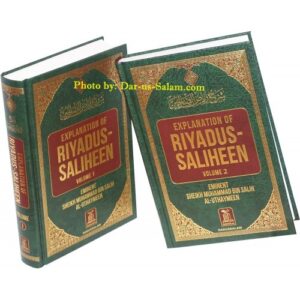The Status of the Sunnah in Islaam
The Status of the Sunnah in Islaam
About the Book:
This is a translation of a booklet titled “Manzilat-us-Sunnah fil-Islaam” (The Status of the Sunnah in Islaam) of Imaam Muhammad Naasir-u-Deen Al-Albaanee, may Allaah have mercy on him. The source for this booklet was a lecture he gave in Doha, Qatar during the month of Ramadaan, 1392H. The talk was later transcribed and published.
AUTHOR: Imaam Muhammad Naasir-ud-Deen Al-Albaanee
TRANSLATED: Al-Ibaanah Book Publishing
PRODUCED BY: Al-Ibaanah.com


This treatise clarifies the position of the Sunnah in Islaam, in that it bears the same status as the Qur’aan when it comes to deriving religious rulings and laws. So one cannot possibly understand and implement the Qur’aan in the absence of the Sunnah, rather they go hand in hand. Imaam Al-Albaanee gives several examples for this.
The author then goes on to explain what is meant by Sunnah in his discussion, in that it refers to only the authentic Sunnah, and not the weak and fabricated hadeeth. This is a very important treatise, defining a key principle of the Salafi Manhaj, which consists of following the Qur’aan and the Sunnah, along with the understanding of the Salaf (i.e. Sahaabah, Taabi’een, Atbaa’ at-Taabi’een). This treatise is also a refutation of the deviant groups that rely on the Qur’aan alone, such as the Qur’aaniyoon, etc.
Quotes from the Book:
“It is unfortunate that there can be found some contemporary tafseer writers and authors that have taken the view of making permissible what has been mentioned in the last two examples, such as the permissibility of eating predatory animals and wearing gold and silk, relying upon the Qur’aan (as proof) only! In fact, there can be found in this present time a group that call themselves the Qur’aaniyoon, who interpret the Qur’aan according to their desires and intellects, without seeking assistance for that in the authentic Sunnah. Rather, the Sunnah, according to them, is subordinate to their desires. So whatever part of it conforms to their desires, they affirm it, and whatever doesn’t conform to their desires, they throw behind their backs (rejecting it).”
“From what has been stated previously, it becomes clear that there is no way for anyone, even if he be a scholar of the Arabic Language and its disciplines, to understand the noble Qur’aan, without seeking assistance in that from the Prophet’s Sunnah in speech and action. This is since he will never be more knowledgeable of the language than the Companions of the Prophet, those who the Qur’aan was revealed to in their language. And (at that time) the language was not blemished with the errors of the non-Arabs and the slang of the common people, but in spite of that, they still erred in understanding these previously mentioned ayaat, when they relied on their knowledge of the language only.”
Related: Saheehayn (Bukhari & Muslim)
“In summary: It is an obligation upon all of the Muslims to not differentiate between the Qur’aan and the Sunnah, with regard to the obligation of accepting both of them together and establishing Laws based on both of them. Indeed this is the guarantee that will prevent them from drifting to the right and the left, and from returning to deviation.”
Study Riyadhus Saaliheen – Start A Study Circle At YOUR Masjid!
ALL PROCEEDS GO TO MASJID BILAL MAINTENANCE & THE SW MUSLIM CHILDREN’S FUND! GIVE MORE HERE PLEASE!
About The Author
His Name and Lineage:
He was Muhammad Naasir-ud-Deen Ibn Nooh Ibn Aadam Najaatee, al-Albaani by birth, Ad-Dimashqee by residence and Al-Urdunee (from Jordan) due to his migration and place of death. He was born in Ashkodera, the capital of Albania, in the year 1332H (1914 C.E.) and it is to this country that he ascribes himself.
He was a Muhaddith (scholar of hadeeth), a Faqeeh (scholar of Fiqh), a caller to the Book and the Sunnah with the understanding of the Salaf As-Saalih (righteous predecessors). And he was a proficient writer and an expert scholar.
His father was Al-Hajj Nooh, from the major Hanafee scholars of his land. During the doomed secularist, Ahmad Zogu’s [1] reign of Albania there was severe oppression for the Muslims of that land. Because of this, Al-Hajj Nooh migrated with all of his children, which included Muhammad Naasir-ud-Deen, fleeing for the sake of his religion to the land of Shaam. He traveled to Shaam due to what was reported in the prophetic ahaadeeth about its virtues and merits. And it is there that he and his family took residence. Fifty years later, the Shaykh (al-Albaani) migrated from here to ‘Amaan, the capital of Jordan. And it is in this city that he remained for the rest of his life as a scholar and teacher and a Faqeeh and educator.
His Educational Background and Teachers:
He received his education in a school, which was part of a relief shelter in Damascus, the capital of Syria. This school served as a place of refuge for seekers of knowledge for many previous generations. He benefited and learned from a number of Shuyookh and people of knowledge the likes of his father Al-Hajj Nooh, Sa’eed al-Burhaanee [2] and others.
Allaah made the science of the Prophetic Hadeeth beloved to him during the prime of his life and the early part of his youth. This was during the time when he would review articles written by Shaykh Muhammad Rasheed Ridaa in the magazine Al-Manaar, in which he would criticize weak narrations that Abu Haamid al-Ghazaalee mentioned in his book Ihyaa ‘Uloom-ud-Deen.
Shaykh Muhammad Raaghib aAt-Tabbaakh, the historian and Muhaddith of Halab (Aleppo), authorized him with an Ijaazah (certification) to teach his collection of narrations on trustworthy reporters, called “Al-Anwaar Al-Jaliyyah fee Mukhtasar Al-Athbaat Al-Halabiyyah.” This happened when he saw the Shaykh’s intelligence and extraordinary abilities and his brightness in comprehending and understanding, [3] as well as his strong desire to learn the Islaamic sciences and the knowledge of Hadeeth.
His Early Role in Da’wah and Effects on the Ummah:
He began writing and authoring books during the first stages of the second part of his life (i.e. after reaching middle age). One of the first books he wrote on Fiqh, which was based on knowing the evidences and using comparative Fiqh, was his book: “Tahdheer-us-Saajid min Ittikhaadh al-Quboor Masaajid” (Warning the Worshipper against taking Graves as a Place of Worship). This book was printed many times. And from his first books in which he referenced and checked hadeeth, was his book “Ar-Rawd-un-Nadeer fee Tarteeb wa Takhreej Mu’jam At-Tabaraanee As-Sagheer” (Blossoming Gardens: Arrangement and Referencing of the book Mu’jam As-Sagheer of At-Tabaraanee). This book is still in manuscript form and not printed.
The Shaykh was called and invited by many Islaamic universities and Muslim organizations around the world to take high positions with them, but he turned down most of them by making excuses due to his many preoccupations with regard to (acquiring and teaching) knowledge.
He was put in charge of teaching the subject of Prophetic Hadeeth in the Islaamic University of Madeenah at the time of its inception for the length of three years, beginning from the year 1381H. Because of him, this move had a great influence in bringing about a scientific and comprehensive revival of the subject of Hadeeth throughout the entire world – on all fronts. As for the official front, then this was by all the universities having a strong concern for that subject, such that they produced a hundred university treatises, which deal specifically with the Science of Hadeeth. As for the general nationwide front, then this was such that a large number of students of knowledge applied for studies in the Science of Hadeeth and specialization in that field. And this goes as well for all the other things that came as a result afterwards. So it became one of the Shaykh’s many effects.
One of the greatest proofs for this is the large amount of Hadeeth books, with checked and authenticated chains of narration, and written indexes for Hadeeth that exist today, a majority of which were not known in previous years. No one can deny this effect due to its clear and obvious nature – not even those who opposed the Shaykh and fought against his methodology.
The Scholars’ Praise for Him:
The senior scholars and Imaams of this time praised him and they would ask him questions, go to visit him, seek religious verdicts from him and exchange letters with him. And if they, may Allaah preserve those of them who are living and have mercy on those who have died, were to be counted, all of them would not be able to be accounted for.
At the head of them was the noble Shaykh and great scholar, ‘Abdul-‘Azeez Ibn ‘Abdillaah Ibn Baaz, [4] for he had great esteem and profound respect for him. May Allaah have mercy on them both. [5]
Shaykh ‘Abdul-‘Azeez al-Hudda said:
“The Shaykh, the great scholar, the ocean (of knowledge), Muhammad Al-Ameen Ash-Shanqeetee (rahimahullaah) – the one whom no one’s knowledge of the Science of Tafseer and the Arabic Language was comparable to his during his lifetime – used to respect Shaykh al-Albaani so remarkably to the point that when he would see him passing by, and he was giving his class in the masjid of Madeenah, he would stop his class to stand and give Salaam to him out of respect for him.”
The great scholar, the teacher, Muhibb-ud-Deen al-Khateeb said:
“And from the callers to the Sunnah who devoted their lives to reviving it was our brother Muhammad Naasir-ud-Deen Nooh Najaatee al-Albaani.”
The great scholar Muhammad Haamid al-Fiqee (rahimahullaah) said:
“…the brother, the Salafee, the Scholar, Shaykh Naasir-ud-Deen.”
The former Muftee of the kingdom of Saudi Arabia, Shaykh Muhammad Ibn Ibraheem Aali Shaykh (rahimahullaah) said:
“And he is the upholder of the Sunnah, a supporter of the truth and an opposition to the people of falsehood.”
During his lifetime, the father, the Shaykh, ‘Abdul-’Azeez Ibn Baaz (rahimahullaah) said:
“I have not seen under the surface of the sky a person knowledgeable of the Hadeeth in our current time the likes of the great scholar, Muhammad Naasir-ud-Deen al-Albaani.”
And he (rahimahullaah) was asked about the hadeeth of the Prophet (sal-Allaahu ‘alayhe wa sallam):
“Indeed Allaah raises up from this ummah at the beginning of every century someone who will revive it for them (i.e. a mujaddid).”
So he was asked who is the mujaddid of this century? He replied:
“Shaykh Muhammad Naasir-ud-Deen al-Albaani. He is the mujaddid in my opinion and Allaah knows best.”
Shaykh Muhammad Ibn Saalih Al-‘Uthaimeen (rahimahullaah) said:
“From what I came to know of the Shaykh through my gatherings with him – and they were few – was that he was very serious about acting upon the Sunnah and fighting against the innovations. And this was regardless of whether it was about the Belief or about actions. As for through my readings of his written works, then I have come to know that about him, and also that he possesses a vast amount of knowledge of Hadeeth, in terms of reporting them and investigating them. And Allaah has benefited many people through what he has written such as about knowledge, aspects of the Manhaj, and concern for the science of Hadeeth. And he has had an enormous influence on the Muslims, all praise be to Allaah.”
The great scholar, Shaykh Zayd Ibn Fayaad (rahimahullaah) said about him:
“Indeed, Shaykh Muhammad Naasir-ud-Deen al-Albaani is from the most prominent and distinguished personalities of this era. He had great concern for the Hadeeth – its paths of transmission, its reporters and its levels of authenticity or weakness. This is an honorable task from the best things in which hours can be spent and efforts can be made. And he was like any other of the scholars – those who are correct in some matters and err in other matters. However, his devotion to this great science (i.e. of Hadeeth) is from that which requires that his prestige be acknowledged and his endeavors in it be appreciated.”
Shaykh Muqbil Ibn Haadee al-Waadi’ee (rahimahullaah) said:
“Indeed, there cannot be found an equal in terms of the knowledge of Hadeeth like that of Shaykh Muhammad Naasir-ud-Deen al-Albaani. Allaah has given benefit through his knowledge and his books numerous times more than what has been accomplished by those zealots for Islaam who act upon ignorance – those who organize reformation and revolutionary movements. And that which I sincerely believe and am convinced about is that the Shaykh Muhammad Naasir-ud-Deen al-Albaani is from the mujaddideen (reformers/revivers) whom the Prophet (sal-Allaahu ‘alayhe wa sallam) spoke the truth of when he said:
’Indeed Allaah raises up from this ummah at the beginning of every century someone who will revive it for them (i.e. a mujaddid).’ Reported by Abu Daawood and authenticated by Al-‘Iraaqee and others.”

REALATED: Articles Extracted From This Book & Lecture
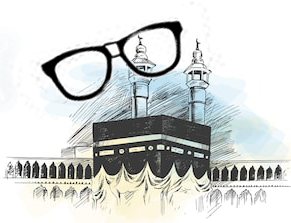
Don’t forget to comment & share. Also please click our ads, they pay the bills. jazakallahu khayr.
